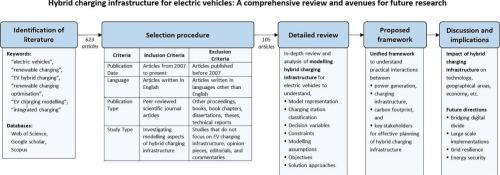电动汽车混合充电基础设施:综合综述及未来研究方向
IF 11
1区 工程技术
Q1 ENERGY & FUELS
引用次数: 0
摘要
电动汽车具有显著的环境效益,但它们对现有电网的依赖引起了人们对需求增加的担忧,对现有能源系统和碳排放的潜在压力,特别是在电网严重依赖化石燃料的情况下。因此,必须将充电站与可再生能源相结合,即混合充电基础设施。这将电网的稳定性和可靠性与可再生能源的可持续性和环境效益相结合,为电动汽车采用相关的挑战提供了一个有希望的解决方案。为了了解电动汽车人机交互规划和设计的发展现状、挑战和机遇,我们对现有的人机交互研究进行了全面的回顾。我们调查所解决的问题的性质,它们的建模方法,目标,约束,要做的决定,以及采用的解决方法。在回顾的基础上,我们确定了人工智能建模的关键机会和未来方向。此外,我们提出了与管理相关的实际实施方法,从案例研究中获得见解,并讨论了战略实施HCI的途径。我们还建议未来的研究应该集中在优化收费策略、数据安全以及解决经济和政策挑战上。本文章由计算机程序翻译,如有差异,请以英文原文为准。

Hybrid charging infrastructure for electric vehicles: A comprehensive review and avenues for future research
Electric Vehicles offer significant environmental benefits, but their reliance on the existing power grid raises concerns about increased demand, potential strain on existing energy systems and carbon emissions, particularly if the grid is heavily reliant on fossil fuel-based sources. Hence, it is imperative to integrate grid-charging stations with renewable energy sources, which is termed as hybrid charging infrastructure. This combines the stability and reliability of the grid with the sustainability and environmental benefits of renewable energy, offering a promising solution to the challenges associated with EV adoption. To understand the current state of developments, challenges and opportunities in the planning and designing of HCI for EVs, we undertake a comprehensive review of existing studies on HCI. We investigate the nature of the problems addressed, their modelling approaches, objectives, constraints, decisions to be made, and the solution methodology adopted. Based on the review, we identify key opportunities and future directions for modelling HCI. Furthermore, we suggest ways for practical implementation with managerial relevance, deriving insights from case studies, and discussing pathways for strategic implementation of HCI. We also suggest that future research should focus on optimising charging strategies, data security, and addressing economic and policy challenges.
求助全文
通过发布文献求助,成功后即可免费获取论文全文。
去求助
来源期刊

Applied Energy
工程技术-工程:化工
CiteScore
21.20
自引率
10.70%
发文量
1830
审稿时长
41 days
期刊介绍:
Applied Energy serves as a platform for sharing innovations, research, development, and demonstrations in energy conversion, conservation, and sustainable energy systems. The journal covers topics such as optimal energy resource use, environmental pollutant mitigation, and energy process analysis. It welcomes original papers, review articles, technical notes, and letters to the editor. Authors are encouraged to submit manuscripts that bridge the gap between research, development, and implementation. The journal addresses a wide spectrum of topics, including fossil and renewable energy technologies, energy economics, and environmental impacts. Applied Energy also explores modeling and forecasting, conservation strategies, and the social and economic implications of energy policies, including climate change mitigation. It is complemented by the open-access journal Advances in Applied Energy.
 求助内容:
求助内容: 应助结果提醒方式:
应助结果提醒方式:


